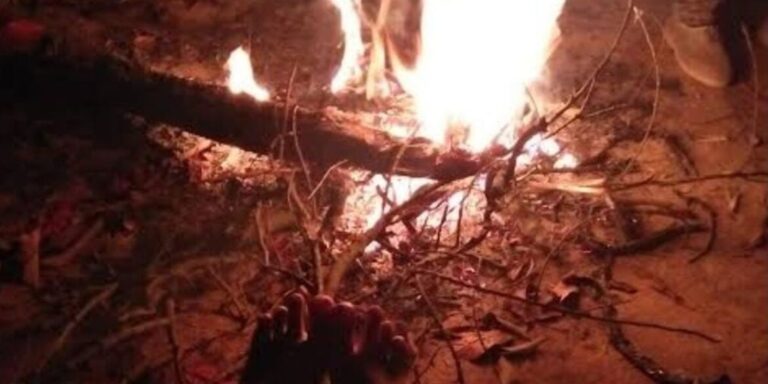Syed Waliullah
Just over the bow-shaped concrete pool, the house stood. It was two-storied, big, huge. It seemed the house stood on the street as it had not spared an inch of front space for a footpath. However, inside, it had a huge backyard, a broad yard too. Just after the toilet, and bathroom the backyard was full of trees—mango, rose apple, jackfruit. It looked like a jungle where even at noon the sun was shy and there was a fusty smell in the weed-carpeted shadowy soil.
Would it have been a sin if the house was built leaving some space in the front?
They were thinking so. Especially Motin. He had a gardening hobby, but till now it has become a reality only in his imagination. “Ah! If I could get a patch of soil!” thought Motin. He would plant mousumi, gandharaj, bakul, hasnahana, two or four roses too. Coming from the office he would sit here in the late evening. To relax with a luxury he would buy a light cane-made chair. Reclining on it he would then gossip with friends. Amzad had a habit of smoking hookah. Keeping an eye on the beauty of the garden, he would have bought a carved hookah. Kader was a storyteller. With a fine breeze, his voice would have been more melodious. And if he would not tell a story at such a moon-blanched flower-scented night, the sky would not fall on us! Carelessly with eyes closed they could quietly enjoy the mellow twilight.
Returning from office Motin tiredly climbed the stair and such thoughts crowded him.
They occupied the house without any force. It was abandoned. The owner had fled. Because of the anarchy of partition, they eventually arrived in this town and badly sought a roof. They found the house after many setbacks. It was locked and empty. They were fortunate to have found it. They were elated at first but immediately after an unknown fear gripped them. The next moment it, however, vanished. And in the evening they broke the gate and entered the house with shouts of victory. They were too excited to feel any sense of remorse or guilt.
The next day the news spread across the city and crowds of people rushed like sea waves. They also needed a roof.
They hid their joy and told the newcomers that there was hardly space for keeping a foot in the house. How could you all take shelter here? Impossible! Look at the small room. It had already four beds huddled together.
Another sympathetic voice cried for the perils of the strangers, “Don’t we understand your hardships? One day we had to bear it. But you are really unlucky.”
The faces of the strangers become blackened at these touching words.
Then a stranger pointed to a room and asked, “That room?”
They said, “It looks empty but it’s not so. Keep eyes close to the floor. Look, two beddings lie there. Just two hours ago the last space was occupied by accountant portly Badruddin who has gone to bring his bedding from his wife’s brother who with his family had taken shelter in his friend’s verandah.”
Again a sympathetic voice cried, “If you had come before two hours, you could have given a fig to Badruddin. Yes, the room is dimly lit but there is a street light beside it. During load shedding you hardly need a lamp!”
These caring voices fell flat to the ears of the strangers—the disappointed, defeated home-seekers.
Meanwhile, police came to investigate the case of the usurpation of the house. Watching the uniformed men they asked themselves if the fled house owner complained to the police to rescue the house. One could hardly believe it. The owner had emptied the house and fled within two days. He might have many difficulties to manage his family. Where was his time to complain? The police had been surely informed by the failed home-seekers. They did it out of jealousy. They thus reasoned. Violence now seemed to be an abiding duty to the occupied.
They resisted.
We might be clerks, poor but we were sons of cultural families. We had occupied the house. But we did not break doors or windows. We did not steal bricks and irons. We knew the laws of the land. Who complained? Not the house owner. So it was invalid.
Kader mourned, “Where will we go? Have we come here out of hobby?”
Without taking any action the sub-inspector with his men returned to the police station. He wrote to his higher authority a lengthy messy report citing both the merits and demerits of the case. The higher authority failed to interpret the deftly hidden meaning of his complex letter. Or in this turbulent time, they were afraid to invite fresh troubles. So they understandably failed to interpret the laws related to the usurpation of the house. Naturally, they did not proceed further. They preferred to hush up the case.
Kader squinted eyes and cleared to his fellow men that there was nothing wrong in confessing that the second wife of the sub-inspector was his kin.
Nobody believed him but all were happy to relish the pleasure of untruth, and they happily pardoned him.
Excitedly one also asked Kader for tea and sweets.
Overnight the house was abuzz with shouts of joy and merriment. Their usurpation of the house at this violent time and the feeling of having a shelter under a roof were not the sole reasons behind their light mood. In fact, the clean and spacious house had given them a new lease of life. In Kolkata, many of them have spent days at Blockman Lane with coolies, at Baithakkhana Lane with office bearers, at Sayed Saleh Lane with tobacco merchants or at filthy Chamru Khansama Lane inhaling putrid air. The house with its spacious rooms, giant windows, broad yard, and backyard forest offered them a taste of a quite different world. Yes, they had not a room of their own, but they had never enjoyed such fresh light and air. Green grass would cover them; their blood would be replenished with oxygen; like rich men, they would glow and they would be freed from such diseases as malaria, cold fever, and tuberculosis.
Lean Eunis already felt a change in his body. He lived at Macleod Street. The lane was dingy. He had a musty room beside the kitchen in a two-story wooden ramshackle house. There he lived with some Gujrati leather merchants for four years. The smell of leather was so foul and pungent that he could hardly smell the foul air of the choked drain or a dead mouse or a rat. Eunis often suffered from fever and early morning cough. Still, he did not leave the neighbourhood because someone said to him that smell of leather could thwart tuberculosis. So he happily lived there. After office, he would stand in front of the window and see the holeless wall of the adjacent house and take a deep breath. His health however did not improve by this practice.
Without food and eating a house seemed dull. For a week they cooked and dined like Mughals. Everybody’s secret technique of cooking came to daylight. One followed his grandmother’s way of making homemade pastry. It, however, turned into a bad food. But all savoured it and licked their fingers. Off and on there was a musical concert in the evening. Habibullah bought a wayward harmonium from somewhere and till midnight he shrilly sang at the top of his voice.
At this time they suddenly noticed a tulsi plant in a raised square brick-made platform at the edge of the yard.
It was Sunday. Modabber was pacing up and down in the yard brushing his teeth with a neem twig. Suddenly he frenziedly shouted. He was a racy man. He was known for making a hill out of a mole. At the drop of a hat, he berated breast. Some friends in fear ran towards him.
“What’s the matter?” they asked.
“Open your eyes.” Modabber said.
“What? What do we see?” They stood confused.
They in the hope of seeing snakes or something like that, missed the tulsi plant.
“Can’t you see the tulsi plant standing awkwardly there? It has to be uprooted. No trace of Hindu culture will be put up with.” Modabber heatedly argued.
They in disappointment looked at the basil plant. It seemed to have died. The green leaves had turned yellow. Weeds had covered its root. It might not be watered for days.
“What are you watching? Root it out!” boomed Modabber.
They stood petrified. With this sudden discovery, they were puzzled. The house seemed to be empty and abandoned though it had on its stair-wall some casually hand-written names. Now it changed its contour. Caught abruptly by the visitors the dry, dying basil plant, it seemed, was unfolding the hidden story of the house.
Modabber impatiently yelled again, “What are you thinking still? Uproot it!”
None of them moved. They did not know well the ways of Hindu culture. However, they all know that in the evening Hindu women light a wick under the basil- stand, bow head wrapping their neck with the end of a sari. Under this abandoned weed-covered basil plant once every evening someone would light a wick. That lonely wick, when the evening star alone brightened the sky, was lit by a vermilion-worn quiet woman. Both in the wedding and funeral, in the sun and shower the wick under the basil plant has spread its light without a miss.
Where is the woman of the house who year after year lighted the wick under this basil plant? Motin once worked in the railway. Without a reason, the pictures of varied railway-goomties (sheds) surfaced before his eyes. Perhaps that woman had found a shelter in one of her relation’s shanty in Asansol, Baidhyabathi, Lilua or Howrah. He saw in one railway shed a sun-baked glossy black sari with a red border. It might be hers. It sadly danced in the mild air. Or she might be sitting at the window side of a running train. She looked out of the window. Her eyes searched for something beyond the horizon. Her journey might have not ended yet. But wherever she stayed at the end of the day her eyes turned teary for her beloved basil plant.
Since yesterday Eunis has been suffering from the cold. He said, “Let it stay there. We are not going to worship it. It is good to have basil plant at home. Juice of its leaves is very effective for cold and cough.”
Modabber turned to others. It seemed they all agreed with Eunis. To root out the plant nobody came forward. Among them, Enayet had an attitude of a moulvi. He wore a beard, and practised prayers five times a day. And in the morning he recited the verses from the Quran. He too was silent. Perhaps he could see the teary eyes of the lady of the house at sunset.
So the basil plant stayed there intact.
The plant escaped its death. But its presence in the house made them uneasy and awkward. A kind of weakness, a sort of uneasiness resulting out of turning the face from a bounded duty ruled them. They could not forget it. Consequently, in that evening adda topic of communalism came to the fore. It replaced common topics of ordinary days such as state affairs, economics, etc.
“They [Hindus] are at the root of everything. Our country was divided because of their meanness, lowness, fundamentalism,” Modabber shrilly claimed. His carefully brushed teeth under the naked bulb glistened
There was nothing new in Modabber’s story. Yet today his story was spiced a bit. In his support glaring cases of tyrannies and injustices done by Hindus were showcased. Within a few minutes, their blood boiled. They breathed heavily.
Among them, Maksud was a leftist. He protested, “Are you not crossing your limit?”
Modabber’s white teeth flashed. “What do you mean?”
Leftist Maksud felt lonely. Firmness in his belief took a jolt.
After some days while Modabber was passing before the kitchen the basil plant came to his notice. He could not help being taken aback. The grass which covered the root of the plant was weeded out. Now the dying dry brown leaves had turned dark green again. Undoubtedly someone was looking after the plant. In secret someone was watering the plant too.
Modabber had a bamboo stick in his hand. He swiftly swept it over the plant. He, however, missed the plant. So it still stayed there intact.
Meanwhile, nobody remembered the plant. Eunis was relieved from his cold the next day. He did not need the juice of the basil leaves.
They thought that they had indeed begun a new life in fresh air and radiant light. Life at Macleod Street, Khansama Lane, and Blockman Street seemed to belong to a hoary past. But they were soon mistaken. So they were terribly shocked at the sudden onslaught.
One day according to the morning plan they returned from the office and were all set to cook a hodgepodge. They heard the cracking sounds of heavy boots on the stairs. Moddaber peeped outside and then hastily ran to the room.
He whispered, “Police have come again.”
They were startled, “Police? Why again? Eunis thought that a burglar from the street might have entered the house, and the police chased him. He was reminded of the story of the rabbit. Having found no ways of escape from the clutch of the hunter the rabbit closed its eyes and thought it could not be seen. Are not they thieves? Have not they hidden the truth? Have not they created here an incredibly luxurious ambience for them knowing everything?
The leader of the police was a traditional man. Keeping his hat under his armpit he swept sweat from his wrinkled forehead. He seemed to be an innocent man. Behind him stood two rifle-carrying constables with huge moustaches. They too seemed to be innocent. They stared at the upstairs and they seemed to be counting wooden poles. In a cote of plastic, a pair of pigeons had built a nest. Perhaps they were watching the birds. Even an innocent man with a rifle took a look at birds.
Motin politely asked, “Whom do you want?”
“You all,” the leader harshly said. “You have usurped the house.”
His words made sense. So they did not protest. They looked at the leader with a childlike curiosity.
“You have twenty four hours. Government Order.”
They silently exchanged glances. Finally, Modabber cleared his throat and asked, “Why? Has the house owner complained?”
Fat Badruddin of the Accounts Office elongated his neck at the backs of the constables in search of the owner. None was there. Some men, however, crowded in the street. To watch others being insulted is his life’s supreme ambition.
“Where do you find the owner?” the leader drily laughed.
One among them also laughed. A ray of hope kindled in their breasts.
“So?”
“Government requisitioned it,” affirmed the leader.
Everyone fell silent for a while. They lost words. Then Maksud gathered courage and asked, “Are we not people of the Government?”
This time the two constables kept their eyes off the pigeons and threw them at Maksud. They were quite amazed. They were still amused at the stupidity of men.
A deep shadow fell on the big house. First they were enraged. Myriad voices of protest were heard—they would go nowhere; they would cling to the poles of the house till death; they would leave the house only if they were dead. After a while, they cooled down. A deep shadow engulfed the house. Where would they go?
The next day Modabber came with good news. The limit of their stay had been extended from twenty-four hours to seven days. They breathed a sigh of relief. But still, the shadow stayed there. This time Modabber did not say that the second wife of the sub-inspector was his kin. But everyone agreed to his unsaid statement.
On the tenth day they all left the house. They came with the force of a storm and they vanished with the same force. The empty house bore the signs of the usurpers’ temporary stay—torn pieces of newspaper littered here and there, an old rope used as a clothesline, butts of biri and cigarette, the heel of a torn shoe.
The tulsil plant at the edge of the yard looked dry. Its leaves became brown again. After the arrival of the police, nobody watered it. Nobody recollected the teary eyes of the woman of the house.
Why did not all recollect those teary eyes?
How did the tulsi plant know? People should have known.
***




